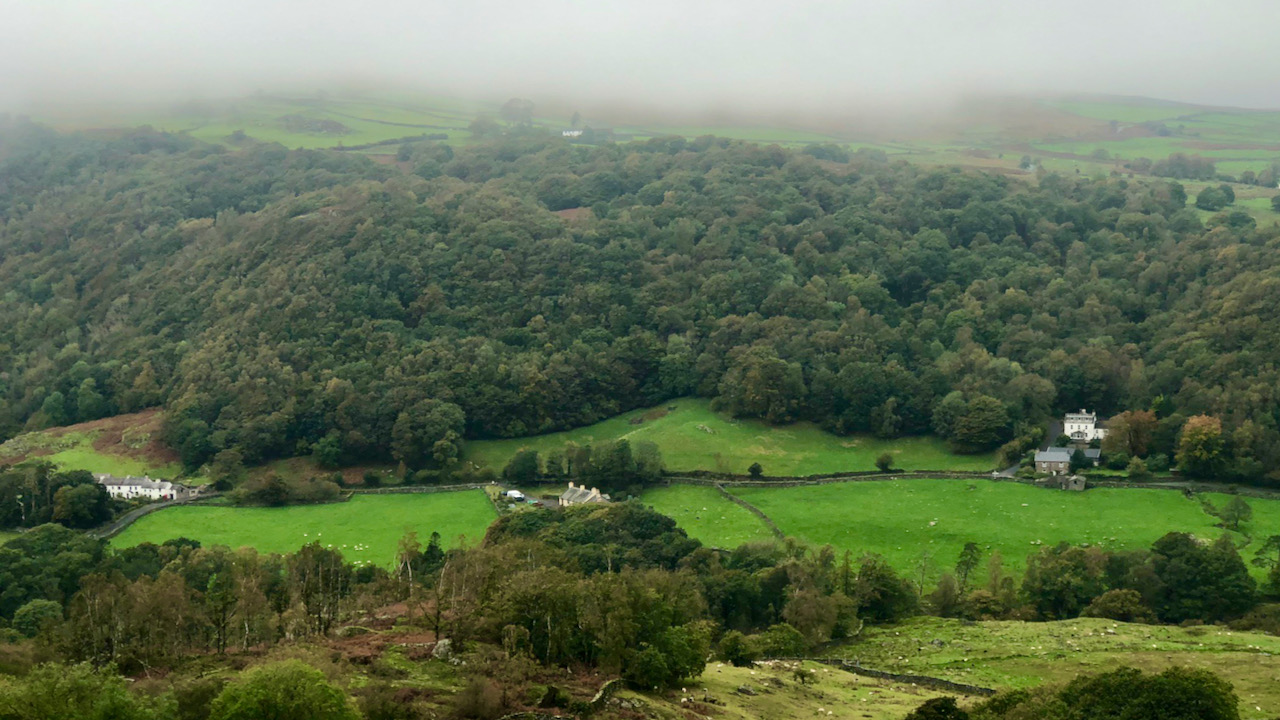I’m still recounting my adventures in the Lake District last weekend. Monday turned out to be a real gloomy one, with clouds hanging low and some drizzle here and there. I reckon I caught a glimpse of the sun once, but those rugged hilltop views remained elusive.
As I descended from the murky heavens, the village of Ulpha revealed itself before me. Calling it a village might be a stretch; it’s more like a cluster of hamlets. They used to call it Ulpha Kirk, thanks to the church nearby. Unfortunately, you can’t spot that in the photo; it’s hidden behind those trees on the bottom left.
The building that is visible overlooking the church is the old post office and shop, which closed its doors back in 2020, and now serves as someone’s private dwelling.
In the centre, you’ve got those almshouses, Gunson Cottages, nestled in a distinctive semi-circular arrangement, although you can’t quite see that from this angle; the trees get in the way. Gunson must’ve been a name with deep roots in these parts. A certain John Gunson tended the bar at the Traveller’s Rest Inn back in 1802, around the time Wordsworth and Coleridge stopped by—but not at the same time1Lindop, Grevel. “A Literary Guide to the Lake District”. Page 358. 1993. Chatto & Windus. ISBN 0701136154.. Coleridge made note that the landlord was a “very intelligent man.”
But another source calls it “The Plough Inn.” Either way, it’s the higher of the two buildings on the right, situated at the foot of the steep climb up to Birker Fell. Like the old Post Office, it’s someone’s private residence now.
This “very intelligent” landlord was probably the same who taught some pompous students a lesson in the early 19th century. It’s a yarn recounted by John Pagan White in his 1873 book “Lays and Legends of the English Lake Country.” The students, supposedly from St. Bees school, were having a grand old time, sipping ale and poking fun at the landlord. When it came time to settle the bill, Gunson, in his thick Cumberland accent, claimed he didn’t do bills. He just told them what they owed. That got a good laugh, with the students assuming he was illiterate.
So, the landlord wrote out the bill in Hebrew, which left the students baffled. Next, he tried Greek, and again, they were clueless. Finally, he served up a bill in Latin, and guess what? Yes, they couldn’t make head or tails of it. After a hearty chuckle, Gunson, of course, told them the amount in plain English.
There’s another version that says the students wrote a note in Latin asking for the bill and sent it with the serving girl. In response, John Gunson sent back the bill in Greek. Those students threw in the towel and asked for it in plain English. But I’ve got a soft spot for the first version myself.
- 1Lindop, Grevel. “A Literary Guide to the Lake District”. Page 358. 1993. Chatto & Windus. ISBN 0701136154.

Leave a Reply